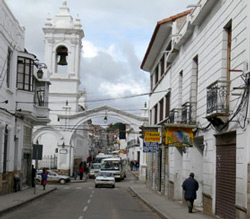 On the morning of January 18, 2005, a long line of investigators stood outside at the Archives and National Library of Bolivia (ABNB) in Sucre. The day promised to reveal one of the greatest mysteries of twentieth century Bolivian history.
On the morning of January 18, 2005, a long line of investigators stood outside at the Archives and National Library of Bolivia (ABNB) in Sucre. The day promised to reveal one of the greatest mysteries of twentieth century Bolivian history.
Before his death, former President Walter Guevara Arce had donated papers to the archive on condition that they not be opened until the 2005. The papers were thought to reveal who killed the former leader of the Bolivian Socialist Falange, Unzaga Oscar de la Vega in 1959. Important clues were found, but investigators still didn’t come up with the answer.
Extremely Valuable Documents
The collection is kept in Guevara ABNB that, among its prize possessions, has manuscripts written before the advent of the printing press (1450). “They are the jewels of the Archives, because they are unique in the world and therefore are called incunabula,” explains archivist Nelva Delgadillo Hurtado.
In the historic capital building are also other texts, such as the only colonial history of the Villa Imperial de Potosi, and Orsúa of Arzano of Sailing, the Dictionary of Ludovico Bertoni Aymara and the manuscript of the Journal of Tambor Vargas.
Nearly Seven Miles of Documents
“Here we keep the memory of the country. Here are the source documents on our history,” said Calvimontes Marcela Inch, director of ABNB.
Files totaling about seven kilometers in length could assemble all the documentation held by the archive since the dawn of the Republic until now. The library has over 200,000 book titles.
The Archives was created in 1883 – a bit late for some documents, since in 1848 the soldiers of the then president Isidoro Belzu burned many texts to make a bonfire. Given the value of the material, their safety is now a priority and users as well as officials are watched 24 hours a day by TV cameras and motion detectors.
An air conditioning system controls the temperature, which is not to exceed 22 degrees centigrade while 50 percent humidity is maintained, to ensure the preservation of the material.
For more information, see: http://www.la-razon.com/versiones/20090531_006744/nota_277_820728.htm (in Spanish)
Also see an 8-page pdf report on the Bolivian National Archives and Library.
Dear Sir or Madam,
I have run out of ideas! I am trying to find Bolivian phone directories or the equivalent for someone who may have lived in La Paz during the period of 1950-1959 or later.
I have tried the New York Public Library,who do not have them in their holdings and have written to the Bolivian Embassy in NY, who did not answer.
Any help you can give will be greatly appreciated.
Thank you in advance.
Sincerely,
David Priever